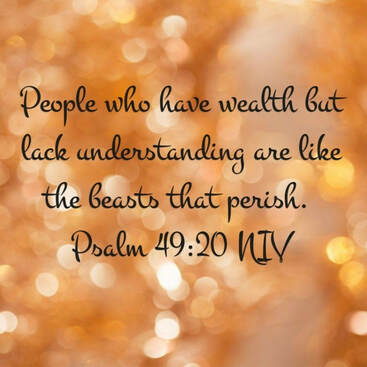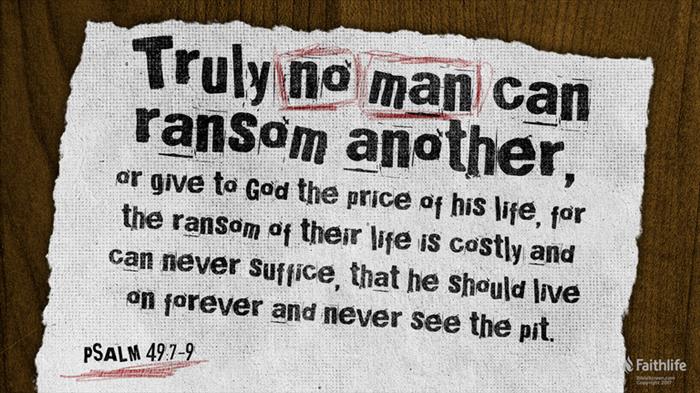Interlude
14 Like sheep, they are led to the grave, where death will be their shepherd. In the morning the godly will rule over them. Their bodies will rot in the grave, far from their grand estates.15 But as for me, God will redeem my life. He will snatch me from the power of the grave.
Interlude
16 So don’t be dismayed when the wicked grow rich and their homes become ever more splendid.17 For when they die, they take nothing with them. Their wealth will not follow them into the grave.18 In this life they consider themselves fortunate and are applauded for their success.19 But they will die like all before them and never again see the light of day.20 People who boast of their wealth don’t understand; they will die, just like animals.
The psalmist who wrote this psalm, identified as a descendant of Korah, is speaking to everyone, rich and poor alike, hoping to guide those who were troubled about the wealth of the wicked. He wants to resolve the perplexing “riddle” of life concerning the apparent blessing of godless people who care more about money and possessions than about God
Psalm 73:3-11 (NLT)3 For I envied the proud when I saw them prosper despite their wickedness.4 They seem to live such painless lives; their bodies are so healthy and strong.5 They don’t have troubles like other people; they’re not plagued with problems like everyone else.6 They wear pride like a jeweled necklace and clothe themselves with cruelty.7 These fat cats have everything their hearts could ever wish for!8 They scoff and speak only evil; in their pride they seek to crush others.9 They boast against the very heavens, and their words strut throughout the earth.10 And so the people are dismayed and confused, drinking in all their words.11 “What does God know?” they ask. “Does the Most High even know what’s happening?”
Such people often pursue wealth at the expense of others. The psalmist asks himself;
Psalm 49:5 (NLT)5 Why should I fear when trouble comes, when enemies surround me?
He realizes that these people are not as blessed as they think.
The psalmist remarks;
Psalm 49:8-9 (NLT)8 Redemption does not come so easily, for no one can ever pay enough 9 to live forever and never see the grave.
Nobody has enough to buy redemption, in this life, and after it there are no resources. The only way that redemption was purchased was by God Himself. He paid this costly price in the suffering and death of Jesus Christ to make it possible for all people to have eternal life.
John 3:16 (NLT)16 “For God loved the world so much that he gave his one and only Son, so that everyone who believes in him will not perish but have eternal life.
Even those driven my material things can see that even the wise, and well as the wealthy die, and leave their wealth to others
Ecclesiastes 9:5 (NLT2)5 The living at least know they will die, but the dead know nothing. They have no further reward, nor are they remembered.
Ecclesiastes 2:18 21-23 (NLT)18 I came to hate all my hard work here on earth, for I must leave to others everything I have earned. 21 Some people work wisely with knowledge and skill, then must leave the fruit of their efforts to someone who hasn’t worked for it. This, too, is meaningless, a great tragedy.22 So what do people get in this life for all their hard work and anxiety?23 Their days of labor are filled with pain and grief; even at night their minds cannot rest. It is all meaningless.
So those focused on money and possessions seek solace in what they leave behind—in establishing a legacy, leaving an inheritance, naming their estates after themselves—all in a vain attempt to immortalize at least some aspect of themselves. This pursuit is pointless in the face of the of death.

The psalmist is confident that God will redeem him from the power of the grave and receive him. This does not refer merely to God’s general protection of His people throughout their physical lives—for the focus on living eternally so this is a prophecy of the resurrection, wherein the righteous will inherit from God
2 Timothy 2:12 (NLT)12 If we endure hardship, we will reign with him. If we deny him, he will deny us.
Proverbs 13:22 (NLT)22 Good people leave an inheritance to their grandchildren, but the sinner’s wealth passes to the godly.
Psalm 49:15 (NLT)15 But as for me, God will redeem my life. He will snatch me from the power of the grave.
The godless, like animals, die without genuine feeling of hope. The godless have no confident assurance of eternity with God in the same way the psalmist has. When a rich man dies that’s it. He can’t take anything of earthly value with him.
Psalm 49:17 (NLT)17 For when they die, they take nothing with them. Their wealth will not follow them into the grave.
No money, no glory, no praise and no honor will go with Him into the grave.
1 Timothy 6:6-10 (NLT)6 Yet true godliness with contentment is itself great wealth.7 After all, we brought nothing with us when we came into the world, and we can’t take anything with us when we leave it.8 So if we have enough food and clothing, let us be content.9 But people who long to be rich fall into temptation and are trapped by many foolish and harmful desires that plunge them into ruin and destruction.10 For the love of money is the root of all kinds of evil. And some people, craving money, have wandered from the true faith and pierced themselves with many sorrows.
This psalm is full of irony but should be taken seriously. All of our money cannot buy our salvation, nor can it or any of our material resources pay for the sins that we have committed. Only the sacrifice of Jesus Christ, the costliest of all ransoms, is acceptable as the payment for our sins.
1 John 2:1-2 (NLT)1 My dear children, I am writing this to you so that you will not sin. But if anyone does sin, we have an advocate who pleads our case before the Father. He is Jesus Christ, the one who is truly righteous.2 He himself is the sacrifice that atones for our sins—and not only our sins but the sins of all the world.

 RSS Feed
RSS Feed